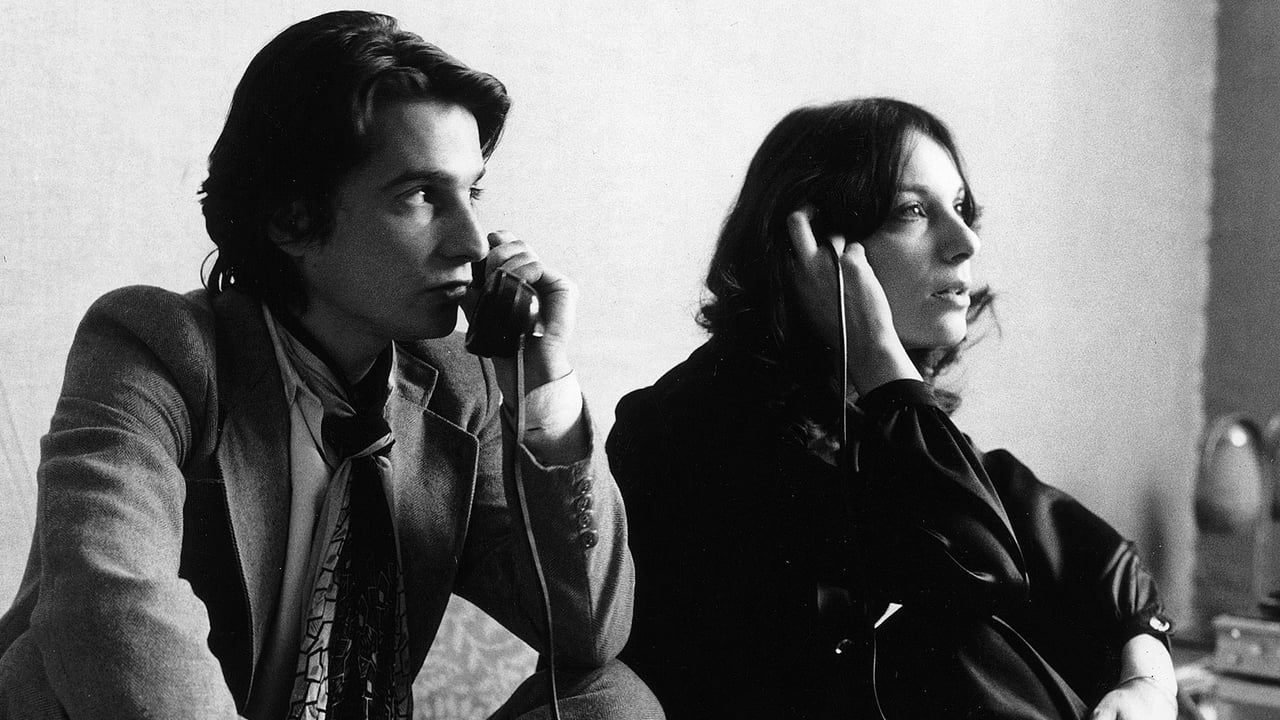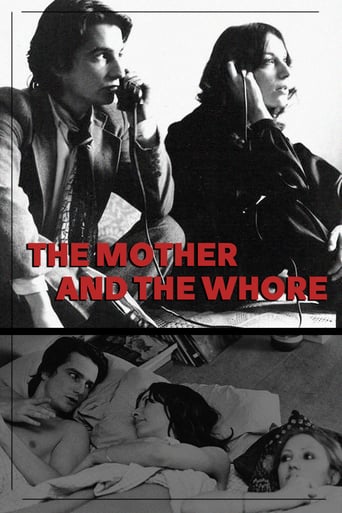

I think this is a new genre that they're all sort of working their way through it and haven't got all the kinks worked out yet but it's a genre that works for me.
... View MorePurely Joyful Movie!
... View MoreCharming and brutal
... View MoreThere's a more than satisfactory amount of boom-boom in the movie's trim running time.
... View MoreTwo female protagonists with overly exaggerated names to display the cynicism and to mock the idea of free love that was still significantly present, but not as widely spread in the time of release of this movie as it was just a few years back.Story is relatively presented through the lengthy chunks of dialogue, with loads of notable close-ups to draw the attention of viewers, showing the apathy, irritation and contempt, but also harmony and gratification occurring within the love triangle formed of the three main protagonists.La maman et la putain, one of the last examples of utterly momentous new wave, also represents a last farewell to this influential movement, leaving the distinctive french cinema in the hands of a new generation with all its beliefs and attitudes.
... View Morethis movie is so complex that it can be given any description and still roll with it. you have a insecure, troubled and fascinating main character (played by Jean-Pierre Léaud) who is trapped between two (no, three) women. we listen to his social, philosophical and moral idiosyncrasies in interminable monologues, we see him working his magic around the three women that he loves. this could be the premise for a fowl movie, full of rigid, cold, uninteresting commentaries. yet director Jean Eustache manages to keep it fresh, ironic and witty. being such a long movie, one cannot but burst into laughing when, after 2 hours of speaking politely, Jean-Pierre Léaud all of a sudden screams on the phone while he remembers a cheesy line from a movie. this kind of situations are purely cinematographic and cannot be fully restored in a commentary. nor can someone restore the tragic and painfully beautiful monologue of Françoise Lebrun towards the end of the movie. 3 and 1/2 hours and worthing every minute.
... View MoreIt is not an easy film to watch - it is over three and a half hours long and it is composed entirely of conversations. Yet it is so incredibly compelling and ruthlessly observational of the human character, that it is, in my humble opinion, one of the very greatest films of all time.The film is depressing, cynical and cruel. (If you want something uplifting, see Jacques Rivette's fantastic Céline and Julie Go Boating, which was made around the same time). It shows the idealism of the late 1960s to be nothing different from the society that it was trying to change.It involves a supposedly liberated ménage-à-trois between Alexandre (played by Jean-Pierre Leaud), Marie (Bernadette Lafont) and Veronika (Francoise Lebrun). Yet Alexandre is shown to be as chauvinistic and jealous as any other man. The women are exposed as being willingly subservient and defining their femininity through the male gaze.The film is an extremely icy end to the highly revolutionary French New Wave. This movement was one of the most significant movements in film history and had a profound effect on cinema as we know it. Jean-Pierre Leaud was one of the key actors of the New Wave, having starred (among other films) in the influential Les Quatres Cent Coups (1959) by Francois Truffaut as a rebellious teenager. Director Jean Eustache is not as well known as other directors from the New Wave, but he should be.There is no improvisation (unlike in John Cassavetes's similar films made in the US) and the dialogue comes from real-life conversations. The film is resonant with Eustache's personal experiences. For example, Francoise Lebrun was a former lover of Eustache. Eustache himself committed suicide in 1981 and the real-life person that the character Marie was based on, did too. The anger and bitterness all culminate in a harrowing monologue by Veronika delivered directly to the audience, breaking down the coldly objective nature of the rest of the film. This mesmerising, personal, and honest filmic statement remains one of the most revealing films of human nature around.
... View More** possible spoilers **I like this film and have no problem staying awake for it. It reminds me of me at 20, except this is even better. Like Veronica says, two chicks at one time. It brings out the horniness in me, the casual conversation, these two real life chicks, rather than hookers, teasing us every step of the way. I get into the conversations too. Even if they are utterly b.s. at times, so what? Every chick, just about, that I've ever talked to and is high on herself is usually full of the same unreasoned rambling gratuitous self-centered b.s. philosophy. It's just a bunch of nonsense, and about as sensible as that other b.s. philosophy chicks are often into: astrological charts. The only deal with this movie is the guy is almost as feminine as the women, he's into the same b.s. and moodiness. The brunette chick is actually the most masculine person there.I think it's kind of funny that the brunette chick gets so obviously turned on by Veronica. She'd love to pull the little blonde away from Alexander, but Veronica plays her all the way. She's brilliant. She gets the brunette thinking there's something up between them, and then she steals the boy-child/man, which is only appropriate since they appear to be from the same age group. The brunette knows she's been had by the end, when she's dropping her face into the palms of her hands while Marlene Deitrich sings in the background that, paraphrasing, there are a million couples in Paris tonight, but I only have this refrain.But do they get married in the end, Alex and Veronica? Mmmm? I can only imagine a super-tumultuous relationship ending in a pre-marriage breakup. They are too selfish to be anything to each other than stepping stones.I like the film though. It kept me entertained, it's got a nice look, and it's sexy.
... View More